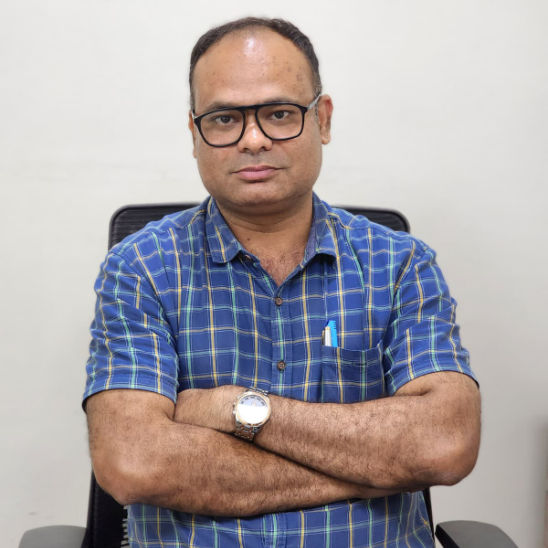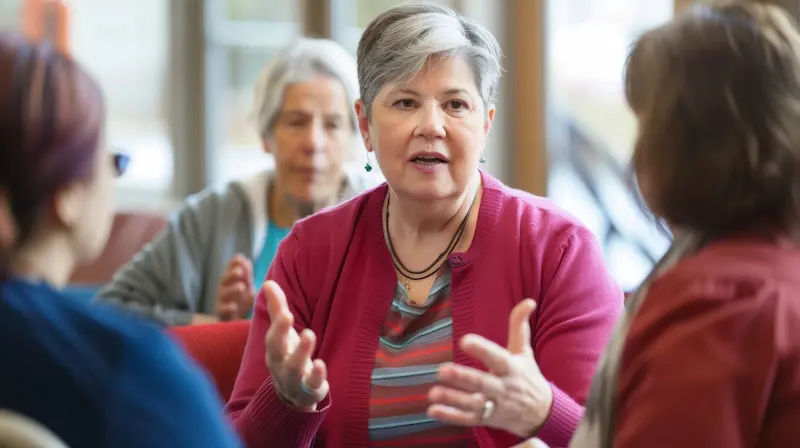Aphasia: Causes, Symptoms, Types, Treatment & Recovery Guide
Aphasia is a communication disorder that affects speaking, understanding, reading, and writing — most often after a stroke. Learn the causes, symptoms, types, diagnosis, and treatment options, plus practical strategies for living well with aphasia. Includes when to seek emergency care and where to get help through Apollo 24|7.

Written by Dr. J T Hema Pratima
Reviewed by Dr. D Bhanu Prakash MBBS, AFIH, Advanced certificate in critical care medicine, Fellowship in critical care medicine
Last updated on 13th Jan, 2026

Introduction
Aphasia is a language disorder that makes it harder to speak, understand, read, or write — yet intelligence remains completely intact. It most often follows a stroke but can also result from head injury, brain tumours, infections, or certain types of dementia. If someone suddenly has trouble finding words, speaking clearly, or understanding conversation, it may be aphasia and could indicate a stroke — a medical emergency requiring immediate action.
This guide explains aphasia in simple terms, covering the different types — such as Broca’s and Wernicke’s — along with common symptoms and diagnostic methods. You’ll learn how doctors and speech-language pathologists identify aphasia, plus the latest treatment options, including speech therapy, communication tools, and digital rehabilitation programmes. We also include practical tips for living well with aphasia, recovery timelines, strategies for families, and when to seek professional help.
Whether you are adjusting after a recent stroke or supporting someone you love, this comprehensive overview brings together trusted information and useful advice to guide recovery with clarity and confidence.Consult a Top General Practitioner for Personalised Advice
What Is Aphasia? A Plain-Language Overview
Aphasia affects language access — not thinking or intelligence.
Aphasia is a communication disorder caused by damage to the brain’s language network, often in the left hemisphere. People may struggle to find the right words, form sentences, understand others, or read and write. Many describe it as knowing what they want to say but being unable to get the words out.
Aphasia varies widely. Some people have difficulty speaking but understand fairly well. Others speak smoothly but with incorrect or made-up words, and comprehension may be reduced. The exact pattern depends on which language areas — typically in the frontal or temporal-parietal regions — were affected.
Aphasia is different from:
• Dysarthria — speech muscle weakness causing slurred speech
• Apraxia of speech — difficulty planning movements to speak
Aphasia specifically affects language processing — the structure of words and sentences, vocabulary access, and understanding.
A key message: Aphasia does not mean loss of intelligence or personality.
Causes and Risk Factors
Stroke is the most common cause of aphasia.
Stroke is the leading cause, when blood flow to language-controlling areas is blocked (ischaemic stroke) or a blood vessel bursts (haemorrhagic stroke). About one-third of stroke survivors experience some degree of aphasia.
Other causes include:
• Traumatic brain injury (e.g., road accidents)
• Brain tumours or surgery affecting language pathways
• Brain infections (e.g., encephalitis)
• Neurodegenerative conditions
One form, Primary Progressive Aphasia (PPA), gradually affects language over time due to ongoing nerve-cell loss.
Risk factors largely mirror those for stroke:
• High blood pressure
• Diabetes
• Smoking
• High cholesterol
• Irregular heartbeat (atrial fibrillation)
• Increasing age
Apollo 24|7 offers convenient home blood testing for HbA1c and cholesterol, supporting prevention and monitoring after stroke.
Even a small stroke can cause severe aphasia if it affects critical areas of the language network.
Signs and Symptoms by Type
Aphasia symptoms reflect where and how the brain is injured.
Understanding common subtypes helps families and clinicians recognise patterns:
Broca’s (Expressive) Aphasia
• Speech is slow, effortful, and uses fewer words
• Comprehension is usually better than speech
• Writing is similarly affected
Example: “want…water…now” instead of a complete sentence
Wernicke’s (Receptive) Aphasia
• Fluent speech but often incorrect, nonsensical or unrelated to the topic
• Poor comprehension of spoken language
• May include invented words
Global Aphasia
• Severe difficulty with both understanding and speaking
• Common right after major strokes affecting large language regions
• Some improvement is possible over time
Anomic (Word-Finding) Aphasia
• Difficulty retrieving specific words or names
• Grammar and comprehension usually remain intact
• Frequent pauses or substitute phrases
Environmental demands matter — noise, fast speech, or multitasking can worsen symptoms. Supportive settings often improve communication success.
When Aphasia Is an Emergency
Sudden communication problems require urgent medical attention.
If aphasia appears suddenly, it could be a stroke. Use the FAST checklist:
• Face drooping
• Arm weakness
• Speech difficulty
• Time to call emergency services
Minutes matter — early treatment, such as clot-busting medication or mechanical clot removal, can reduce permanent disability. Do not drive yourself to the hospital; emergency teams are trained to assess and treat stroke instantly.
If new language issues persist after a transient episode or head injury, consult a doctor online with Apollo 24|7 for evaluation and referral. Early action improves outcomes.
How Aphasia Is Diagnosed
Diagnosis involves brain imaging and a communication assessment.
Doctors typically perform:
• CT scan — quick check for bleeding
• MRI scan — detailed view of brain tissue damage
• Stroke-risk tests — blood pressure, heart rhythm, HbA1c, cholesterol
Speech-language pathologists (SLPs) assess:
• Speaking and conversation
• Understanding spoken and written language
• Reading and writing skills
• Functional communication in daily life
They also distinguish aphasia from:
• Dysarthria (muscle control issues)
• Apraxia of speech (movement planning issues)
Accurate diagnosis leads to more effective, personalised therapy.
Treatment and Rehabilitation Options
Speech-language therapy is the foundation of aphasia recovery.
Early, intensive therapy supports better outcomes — but improvement can continue for years with ongoing practice.
Evidence-based therapies
• Melodic Intonation Therapy
Using rhythm and melody to improve speech production
• Constraint-Induced Language Therapy
Encouraging verbal communication by reducing alternative strategies
• Script Training
Rehearsing practical conversations like ordering food or calling a pharmacy
• Semantic Feature Analysis
Activating related concepts to improve word retrieval
Most people benefit from a blend of methods tailored to personal goals.
Technology and Tele-rehabilitation
Apps and teletherapy offer:
• Extra home practice
• Easier access to specialists
• Motivating structured exercises
Some programmes use AI to simulate real conversational practice.
Group Therapy and Community Programmes
• Builds confidence
• Reduces isolation
• Supports real-world communication
If progress seems limited, Apollo24|7 can connect you with neuro-rehabilitation specialists for an enhanced care plan.
Living With Aphasia: Practical Coping Strategies
Small routine adjustments greatly improve communication success.
Supportive communication strategies
• Maintain eye contact and get attention first
• Reduce noise and distractions
• Speak clearly and at a natural pace
• Ask one question at a time
• Use gestures, pictures, writing or drawing
• Confirm understanding of key points
Home practice and AAC supports
Tools may include:
• Alphabet or communication boards
• Daily diaries or notebooks
• Tablet-based speech apps
AAC (Augmentative and Alternative Communication) tools can bridge gaps and restore independence.
Work, school, and social life
With adjustments like extra time, written instructions, or quieter spaces, many people successfully return to responsibilities and hobbies. Social participation boosts recovery motivation.
Communication works best as a team effort — family, friends, and therapists aligned together.
Recovery Timeline and Prognosis
Recovery varies, but improvement can continue for years.
Many experience the most rapid recovery in the first few months due to brain healing and early therapy — yet ongoing progress is common long-term.
Progress depends on:
• Type, size, and location of brain injury
• Age and general health
• Participation in therapy
• Family and social support
• Mood and sleep health
Some individuals may progress from severe to milder types (e.g., global → Broca’s → anomic). Apollo 24|7 can support continued care planning and monitoring of risk factors such as blood pressure and diabetes.
A good mindset is to build a “communication toolbox” — combining regained skills with practical compensations.
Preventing Stroke-Related Aphasia
Stroke risk management significantly reduces future aphasia risk.
Key prevention tips:
• Control blood pressure and diabetes
• Keep cholesterol within the target
• Stop smoking
• Stay active and maintain a healthy diet
• Manage atrial fibrillation with medical guidance
Regular check-ups and home monitoring are crucial. Apollo 24|7 provides accessible HbA1c and lipid testing, supporting long-term stroke prevention.
Treatment of sleep apnoea may also support brain health and rehabilitation success.
Special Focus: Primary Progressive Aphasia (PPA)
PPA involves a gradual language decline over the years.
Unlike stroke-related aphasia, PPA progresses slowly due to neurodegeneration. Early signs include:
• Word-finding difficulties
• Trouble following complex language
• Grammar errors
There is currently no cure, but therapy focuses on:
• Preserving communication strengths
• Teaching compensatory strategies
• Early planning for future needs
Techniques such as voice banking and AAC support connection and independence as symptoms change.
Identity remains intact — meaningful routines and preferred activities should remain central in care plans.
Children and Aphasia: Rare but Real
Childhood aphasia usually follows acquired brain injury.
Causes include paediatric stroke, head trauma, or infection. It is distinct from developmental language disorders.
Signs:
• Sudden loss of words or language skills
• Difficulty understanding classroom language
• Changes in reading or writing abilities
School-based therapy and accommodations help children re-engage with learning. Collaboration between families, therapists, and educators is key.
Children’s brains show strong neuroplasticity — consistent support leads to meaningful recovery.
Research and What’s Next
New tools aim to maximise gains and personalise therapy.
Promising areas include:
• Brain stimulation combined with therapy
• Intensive comprehensive therapy programmes
• Home-based digital rehabilitation
• AI-driven conversational training
• Imaging tools guiding tailored treatment approaches
The future of aphasia care blends precision medicine, high-quality therapy, and strong community participation.
How to Find Help and Resources
The right support network makes communication recovery stronger.
Speech-Language Pathologists
Look for experience with stroke and aphasia, functional goal-setting, and home-practice support. Teletherapy is a strong alternative when in-person visits are challenging.
Apollo24|7 provides access to doctors online for referrals, ongoing monitoring, and coordination with rehabilitation specialists.
Support and Information Sources
• Local rehabilitation centres and support groups
• National and international aphasia associations
• Online conversation groups and therapy communities
Building a multidisciplinary team — SLPs, family, primary care, neurologists, and employers/teachers — helps maintain progress over time.
Conclusion
Aphasia changes how words are accessed and expressed — not who a person is. From sudden onset after a stroke to gradual changes in primary progressive aphasia, early medical attention and continued personalised therapy make a major impact. Recognising symptoms quickly — especially in emergencies — helps protect brain function and independence. Once medically stable, speech-language therapy, practical communication supports, and family involvement all strengthen recovery.
Even months or years after a stroke, improvement is still possible with structured practice and a supportive environment. If progress slows or new challenges appear, Apollo 24|7 can help review treatment plans, coordinate referrals, and support ongoing health monitoring. Managing stroke risk through blood pressure, diabetes control, cholesterol checks and lifestyle changes also reduces long-term complications.
Most importantly, stay connected. Build routines that encourage conversation, find local support groups, and use communication strategies that reduce frustration on both sides. With patience, collaboration and the right tools, people with aphasia can regain confidence, maintain meaningful relationships and participate fully in life.Consult a Top General Practitioner for Personalised Advice
Consult a Top General Practitioner for Personalised Advice

Dr. Ashita Kuruvilla
General Practitioner
7 Years • MBBS
Kolkata
KVC CLINIC, Kolkata

Dr. Vivek D
General Physician
4 Years • MBBS
Bengaluru
PRESTIGE SHANTHINIKETAN - SOCIETY CLINIC, Bengaluru

Dr Syed Mateen Pasha
General Physician
2 Years • MBBS
Bengaluru
PRESTIGE SHANTHINIKETAN - SOCIETY CLINIC, Bengaluru

Dr. Anand Ravi
General Physician
2 Years • MBBS
Bengaluru
PRESTIGE SHANTHINIKETAN - SOCIETY CLINIC, Bengaluru

Dr. Debdatta Pati
Psychiatrist
18 Years • MBBS, DPM, MD (PSYCHIATRY)
Kolkata
MCR SUPER SPECIALITY POLY CLINIC & PATHOLOGY, Kolkata
Consult a Top General Practitioner for Personalised Advice

Dr. Ashita Kuruvilla
General Practitioner
7 Years • MBBS
Kolkata
KVC CLINIC, Kolkata

Dr. Vivek D
General Physician
4 Years • MBBS
Bengaluru
PRESTIGE SHANTHINIKETAN - SOCIETY CLINIC, Bengaluru

Dr Syed Mateen Pasha
General Physician
2 Years • MBBS
Bengaluru
PRESTIGE SHANTHINIKETAN - SOCIETY CLINIC, Bengaluru

Dr. Anand Ravi
General Physician
2 Years • MBBS
Bengaluru
PRESTIGE SHANTHINIKETAN - SOCIETY CLINIC, Bengaluru

Dr. Debdatta Pati
Psychiatrist
18 Years • MBBS, DPM, MD (PSYCHIATRY)
Kolkata
MCR SUPER SPECIALITY POLY CLINIC & PATHOLOGY, Kolkata
More articles from Aphasia
Frequently Asked Questions
1) What is aphasia in simple terms?
Aphasia is a communication disorder caused by brain injury that makes it difficult to speak, understand language, read, or write — but intelligence remains intact.
2) How long does aphasia last after a stroke?
Recovery is fastest early on, but improvement can continue for years with consistent therapy and daily communication practice.
3) What are the main types of aphasia?
Broca’s affects speech production; Wernicke’s affects comprehension; global aphasia is severe; anomic aphasia mainly affects word-finding.
4) How is aphasia treated?
Speech-language therapy is the primary treatment, supported by technology, home practice, and community conversation programmes. Apollo24|7 can help arrange specialist care.
5) How is aphasia different from dysarthria or apraxia of speech?
Aphasia affects language processing; dysarthria involves muscle weakness; apraxia involves movement planning — a clinician determines the differences for proper treatment.

